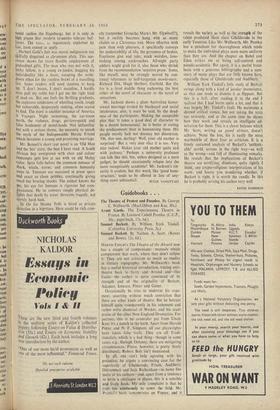Guidebooks . . .
The Theatre of Protest and Paradox. By George E. Wellwarth. (MacGibbon and Kee, 30s.)
MARTIN ESSLIN's The Theatre of the Absurd now has a couple of companions: manuals which complement that work, where they don't eclipse it. They are not criticism So much as studies in literary topography. Mr. Wellwarth's book has a useful historical introduction, tracing anti- theatre back to 'Jarry and Artaud andlike Esslin—the author is quite convinced of its strength and of the originality df Beckett, Adarnov, lonesco, Pinter and Genet.
Occasionally he tries to undercut his argu- ment, asserting without much conviction that there are other kinds of theatre. But he betrays himself quite transparently in his vehement and rather witty. dismissal. of Wesker, and his scant praise of the other. New England Dramatists. For patriots. this is no avuncular pat from Uncle Ken; it's a punch in the teeth. Apart from Harold
Pinter and N. all our playwrights haVe taken false trailS. They are all Tradi- tionalists, which is a bad thing—though in some' cases, e.g., Shelagh Delaney, there are mitigating circumstances. Praise, howeVer, is pretty thinly distributed;- Robert Bolt isn't mentioned.
In . all, one • can't help agreeing with his prejudice; . he' argues a convincing case for the
superiority of Ghelderode, Frisch, Audiberti, Dfirrentnatt and Jack Richardson—to name five more of his authors - and, apart from a tendency to write a catalogue in places, this is a sensible and lively book. My' only complaint is that he tries too assiduously to cover the field. Mr. ProbkO'S book concentrates on France, and it reveals the variety,as well as the strength of the talent produced there since Ghelderode in the early Twenties. Like Mr. Wellwarth, Mr. Pronko has a penchant for thoroughness which tends to make the individual plays seem more uniform than they are. And the chapter on Babel and Eden strikes me as being soft-centred and pieudo-academic. But again, it is a useful hand- book with a generous bibliography and a sum- mary of many plays that are little known here, especially those of Ghelderode and Audiberti.
William York Tindall's little study of Beckett swings along with a kind of jocular insouciance, so that one tends to dismiss it as flippant. But this is a foil; after reading. it to the end I realised that I had learnt quite a lot, and that it was largely. Mr. Tindall's fault. He maintains a shrewd critical stance, but not taking the texts too seriously, and at the same time he shows how they work and reveals an intelligent ad- miration for them. This is a clever balance which Mr. Scott, writing an grand serieux, doesn't achieve. None the less, his is easily the most worthwhile of these four as criticism. It is a firmly sustained analysis of Beckett's 'unthink- able' world, serious in the right way—as well as the wrong—and full of illuminating remarks. He reveals that the implications of Beckett's theatre are terrifying; dismisses, quite rightly, I think, any crypto-religious interpretations of his work; and leaves you wondering whether, if Beckett is right, it is worth the candle. In this he is probably serving his author very well.
KEITH HARRISON


































 Previous page
Previous page